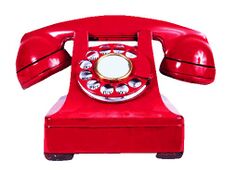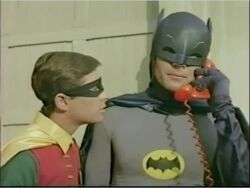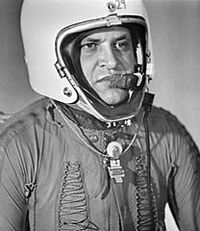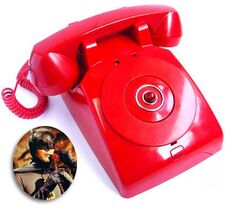Hotline
- This article is about the magical telephone in the White House. For other uses, see the disambiguation page.
The hotline is a red telephone providing direct service between the White House in Washington, D.C. and the Kremlin in Moscow. The hotline was modeled on the emergency telephone connecting Commissioner Gordon in Gotham City with the bat-cave. Pressing a button on this hotline achieved direct communication with the Batman, or at least with Alfred, Batman's dimwitted but excruciatingly proper British butler.
History[edit]
Though there are many hotlines between national capitals, the most famous one is the Washington-Moscow link. This is also known as the "red telephone," although it is not red, and it is not a telephone. This link was established in June 1963, in the wake of the Cuban Missile Crisis.
This crisis occurred in 1962 when Soviet Premier Nikita Khrushchev was testing the young, charismatic, and moronic U.S. President John F. Kennedy to see whether Khrushchev could get away with putting nuclear missiles in Cuba. Though he did not, diplomats thought that much anguish could have been relieved if the two leaders could simply telephone one another and ask, "Are you fricking out of your mind?"
The Crisis was resolved by Khrushchev removing its missiles, and Kennedy in turn removing American defense guarantees from the relatively inconsequential nations Italy and Turkey. Planning for the hotline shifted into high gear.
The need for a single direct telephone line, rather than wading through the phone book and various telephone exchanges, had been evident for years, beginning one fateful evening in 1958, when Khrushchev staggered back from the local vodka bar to find that his wife had locked him out. He nipped over to his office in the Kremlin to call a friend with a spare bed. But he accidently dialed President Dwight D. Eisenhower, and told him that he was his “besht mate” and “all women (and Hungarians) are bitches.”
As a result of the call, Khrushchev was invited for a ten-day trip to party in New York, Los Angeles, and San Francisco. During the visit, the two nations agreed not to go to war over Antarctica. The Antarctic Treaty still stands today, and is as pointless to the indigenous penguins that occupy that gigantic ice desert as Versailles was for tailgating BMW drivers. Another result of the visit was to further convince Khrushchev that “all women are bitches,” though those in San Francisco do put out.
In May 1960, Eisenhower intended to call Khrushchev to ask permission to fly a U2 over Russia for sightseeing. But Eisenhower was no better at memorizing numbers than Khrushchev, and the call instead went to Mamie on the residence level of the White House. "Oh, fine, dear," she replied, which Eisenhower construed as permission from a receptionist at the Kremlin. Pilot Gary Powers was shot down and had to endure strenuous KGB interrogation and devise convincing cover stories until the next showy prisoner exchange.
The key event during the period, however, was the release of the James Bond film Dr. No. In the movie, "M" had a red telephone that linked directly to the Prime Minister, which was every bit as cool as Sean Connery’s shameless womanizing with sultry foreign beauties. This is what convinced President Kennedy that he too had to get one — a hotline, that is.
The original "hotline" used teletypewriter technology. Much like an old UnNews Audio, it was thought that this version of the hotline would soothe frayed nerves by the clacking of a Teletype in the background, perhaps enough that they would ignore the blatant illogic coming through from the other end, as is the hope at UnNews Audio. Subsequent versions used a telecopier and then email. Thus, there has never been a telephone with a big black button on the top that one national leader could press to be connected directly with his swarthy counterpart, assuming that neither is having anything prurient done to him under the desk, pretending that the two spoke the same language, and ignoring the fact that the leaders have a cellphone in one pocket and a Blackberry in the other, and they have one another on "speed dial."
Operation[edit]
To place a call on a hotline, one simply picks up the headset and presses the button. Immediately, the counterpart telephone begins ringing. Assuming the counterpart national leader is sitting at his desk and has nothing better to do than wait for a call to come in, he picks up his hotline, the international crisis is quickly resolved, and a nuclear war is averted.
If the maid or Monica Lewinski is in the Oval Office and thinks it might be a neat prank to use the hotline and see what happens, an international crisis is instead quickly generated and a nuclear war is caused.
Pressing the button effects direct service to Moscow. However, if the presser requests room service, it will take a very long time to arrive, even via ballistic missile. Russian pizza houses may accede to a request to add anchovies but will probably resist adding pineapples.
Other uses[edit]
In September 2011, President Barack Obama lamented the deterioration of America's transportation grid since the days when the "Intercontinental Railroad" was built. Indeed, there is no cellphone service at all on this line, as there are few cell towers in the North Atlantic Ocean and none at all in the infamous Slough of Despond. Getting through to a disinterested help-desk in Washington to confirm whether there are baby-changing facilities — or to complain that the air conditioning stopped working at about the time the train took one of the notorious hairpin curves — takes about eight months by post. Often the letter carrier is riding the next train and obviously will never catch up to you.
Fortunately, Congress responded to this plea and appropriated funds to put a hotline aboard every train. A simple press of the button puts you in touch with the President, who is eager to sign you up for universal coverage. Either him or the Russian Premier.




